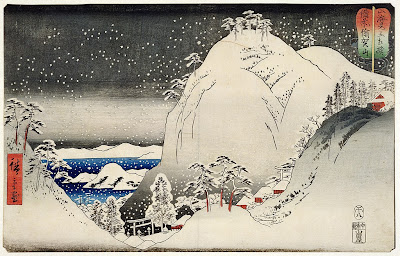It's wonderful how a poem you have long been familiar with -- a poem you think you "know" -- suddenly and unexpectedly moves you. I have recently been browsing in The New Oxford Book of Victorian Verse, visiting old standbys and hoping to make new discoveries. Among the former, I happened upon this:
Rondeau
Jenny kissed me when we met,
Jumping from the chair she sat in;
Time, you thief, who love to get
Sweets into your list, put that in:
Say I'm weary, say I'm sad,
Say that health and wealth have missed me,
Say I'm growing old, but add,
Jenny kissed me.
Leigh Hunt (1784-1859), in Christopher Ricks (editor), The New Oxford Book of Victorian Verse (Oxford University Press 1987).
A nice but slight thing, one might think. Written by someone who is not usually thought of as a poet. It is a standard presence in anthologies of all sorts, and, once read, is likely to be passed over as the years go by. But I had been away from it for a long time. So I decided to stop and read it.
And, unaccountably, it struck a chord with me. Was it the cast of light in the sky that day? The season? Senescence? The state of the world? Who knows. But I do know that catch of breath, that heart-pause: Well, then, here is life.
George Charlton (1899-1979)
"The Churchyard at Leonard Stanley, Gloucestershire: Spring" (1942)
As you have heard me say here before, dear readers: "In poetry, one thing leads to another." After reading "Rondeau," this presently came to mind:
Memory
Is Memory most of miseries miserable,
Or the one flower of ease in bitterest hell?
Dante Gabriel Rossetti (1828-1882), in William Rossetti (editor), The Collected Works of Dante Gabriel Rossetti, Volume I (Ellis and Scrutton 1886).
Rossetti's meditation on memory is significantly less sanguine than Hunt's lovely preservation of a passing, ostensibly prosaic moment. (Although Hunt has no illusions about the quiddities of life.) I suspect that Rossetti's complicated and fraught romantic life might be the source of his gloominess. Yet, still, even "one flower of ease in bitterest hell" is something. And, in a life, it might be enough.
George Charlton
"The Churchyard at Leonard Stanley, Gloucestershire: Summer"
If we are fortunate, in time each of us ends up with a handful of these never-fading flowers. I am not speaking of memories in general, which rise and fall within us incessantly. Rather, I am thinking of the select few charmed revenants of our life, the moments of timelessness and of absolute clarity which haunt us, whether we want them to or not. The winnowing process that leads to the handful is a mystery. We play no conscious role in that process. Oh, yes, what remains with us comes from within us. But these moments -- which are indeed our life -- have a life of their own.
Revaluation
Now I remember nothing of our love
So well as the crushed bracken and the wings
Of doves among dim branches far above --
Strange how the count of time revalues things!
Patrick MacDonogh, Poems (edited by Derek Mahon) (The Gallery Press 2001).
George Charlton
"The Churchyard at Leonard Stanley, Gloucestershire: Autumn"
Are these revenants as close as we come in this World to beauty and truth?
While You Slept
You never knew what I saw while you slept.
We drove up a wide green stone-filled valley.
Around us were empty heather mountains.
A white river curved quickly beside us.
I thought to wake you when I saw the cairn --
A granite pillar of that country's past --
But I let you sleep without that history.
You did, however, travel through that place:
I can tell you that your eyes were at rest
As the momentous world moved beyond you,
And that you breathed in peace that quarter hour.
We seldom know what is irreplaceable.
You sang old songs for me, then fell asleep.
I worried about what you were missing.
But you missed nothing. And I was the one who slept.
sip (Glen Coe, Scotland, c. 1986. For JAH.)
George Charlton
"The Churchyard at Leonard Stanley, Gloucestershire: Winter"




































